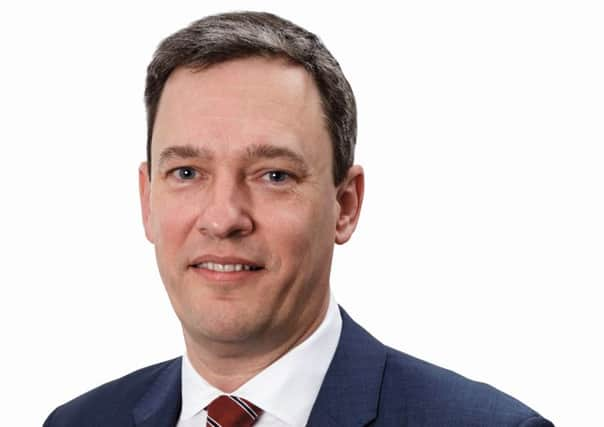Monday interview: Nick Jefferies, chief executive of Acal
This article contains affiliate links. We may earn a small commission on items purchased through this article, but that does not affect our editorial judgement.


When Nick Jefferies meets leading Scottish institutions tomorrow and Wednesday, the boss of the customised electronics group Acal will stress his focus: acquisitions, margin improvement and niche markets.
He certainly has the track record since joining the then-lossmaking Acal as chief executive in January 2009, transforming the group from a bulk electronics and IT distributor into a designer, maker and supplier of bespoke electronics to global industries.
Advertisement
Hide AdAdvertisement
Hide AdAcquisitions? Jefferies has been busy and is not sated. He has spent £140 million on 12 acquisitions, mainly in Europe, and especially in the Nordic countries, in the past seven years.
“We think there are loads more opportunities. We haven’t even started – there is so much to go for,” he says. “We will buy a lot of businesses that we can build up and make more efficient. Acquisitions are a very big part of what we do.”
And we are not just talking bolt-ons. Acal tapped the main stock market for £55m in July 2014 to buy Noratel, the major Norwegian-based maker of transformers and magnetic components, and Jefferies said he would come to the market again for equity if there was a major deal opportunity.
One Scottish institution that has bought into the Jefferies strategy is Aberdeen Asset Management, which with 15 per cent is Acal’s second largest investor.
Acal has a number of significant business streams, including transport, medicine, renewables and industrial connectivity – the last being the so-called Internet of Things.
Its niche components for high-growth end markets include the urban rail network in the US, sub-system designs for American giant GE’s medical division, and temperature sensors for the Nespresso coffee machines made famous in advertising by Hollywood star George Clooney.
The company’s biggest customer is Danish-based Vestas, one of the biggest wind turbine makers in the world, while it also does work for the UK Ministry of Defence, designing control systems and dishes for the radar the MoD uses to monitor activity on its military training grounds.
Acal’s communications division – 25 per cent of revenues – supplies wireless controllers to blow cool air without an accompanying circus of cables into events such as rock concerts and marquee exhibitions.
Advertisement
Hide AdAdvertisement
Hide AdMeanwhile, profit margin projections are on the march. Last week Acal posted a 7 per cent rise in underlying profits to £7.3m, with a group margin of 5.6 per cent.
Two years ago Acal set a mid-term – three to five years – margin target of 6 per cent, increasing this to 7 per cent last year and boosting it again to 8.6 per cent at its latest results.
Acal-followers in the City say the key is to continue Jefferies’ core strategy of shifting more of the business to its design and manufacturing business, where the specialised products yield higher return on sales. A core objective is to hoist the proportion of bespoke design and manufacturing products to 65 per cent of the business from 51 per cent in the last financial year.
Jefferies says he has no interest in getting into consumer electronics. “They can be high-volume, but very cyclical, influenced by the latest fad for kids,” he says.
The chief executive also does not dismiss the notion that Acal’s lower-margin custom distribution arm, where the company adds product to initial work done by other suppliers, might be sold or spun off.
“I would. We got out of commodities and got into custom distribution. A business has to evolve,” Jefferies adds. On more macro-topics, the Acal boss is relaxed on Brexit and can see the silver linings for the company of a Trump presidency.
He says the UK’s Brexit vote “made people uncertain, there was a collective pause in investment (by customers)”. But he says that any cross-border European tariffs in the wake of Brexit proper would have “minimal effect because, for instance, we don’t ship from the UK to Germany and vice versa”. UK is currently about 18 per cent of the business, and Jefferies foresees it staying about that level.
About 5 per cent of Acal’s revenues are in America, and he says president-elect Trump’s high-profile talk on the need for infrastructure improvement could play well for the company “as would his talk of halving corporation tax there”.
Advertisement
Hide AdAdvertisement
Hide AdJefferies was an engineer by training before moving across to business – “the reason is I was earning a pittance as an engineer” – including working on the Rapier surface to air missile system for Racal Decca Defence just after the Falklands War.
He was head of global electronics at Electrocomponents when Acal chairman Richard Moon – who steps down next April – first tried to sell the business to the group and then wanted to poach him.
“At first I said no – the Lehman collapse had just happened – but I quickly thought it was the wrong decision, and rang Richard back. Acal was 12 months from bankruptcy at the time. But I was right, this will be a big company.”
30-SECOND CV
Born: 31 January, 1966
Education: Brooklands Technical College; Open University
What did you want to be at school? A vet first, then an electronics engineer
First job: a trainee engineer
Best business advice ever given to you? Never give up
Car: Mercedes GLE 250d
What couldn’t you live without? Exercise and fine red wine (but not together)
Favourite holiday destination? Barbados
Best thing about your job? The opportunity